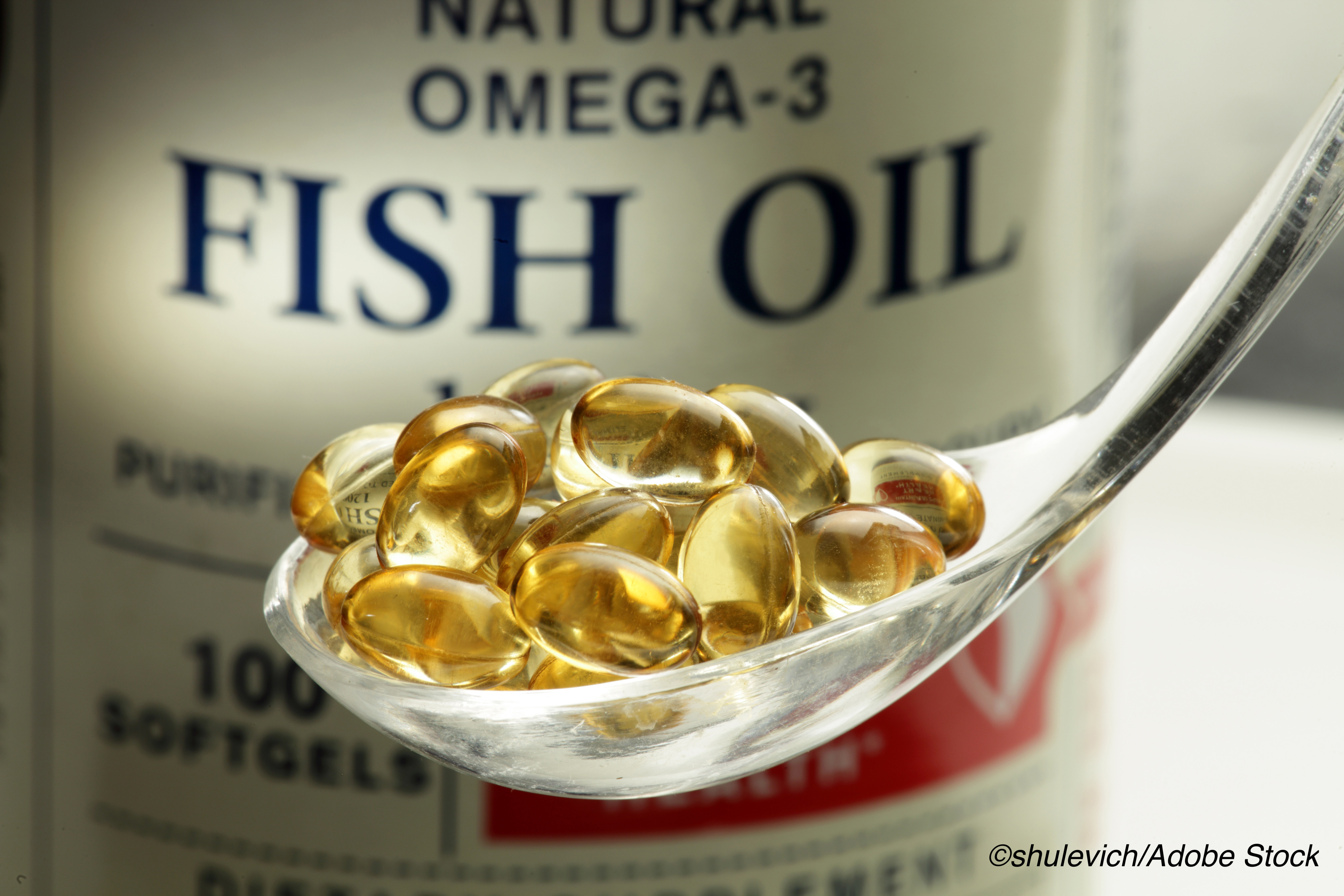WASHINGTON—Secondary analysis of the STRENGTH trial—which found no benefit or harm in supplementing diet with omega-3 fatty acids—casts doubt on the results of REDUCE-IT study that indicated that the fish oils might improve cardiovascular outcomes, researchers suggested here.
In the STRENGTH trial, patients at high risk for cardiovascular events who had the highest levels of eicosapentaenoic acid (EPA) and docosahexaenoic acid (DHA) in their blood one year after taking daily omega-3 carboxylic acid had similar rates of major cardiovascular events as people taking a corn oil placebo, reported Steven Nissen, MD, professor of medicine at the Cleveland Clinic.
In his presentation at the 2021 virtual scientific sessions of the American College of Cardiology, he said, “Despite a 443% increase in EPA levels with omega-3 carboxylic acid, the top tertile was not associated with any benefit. And despite a 68% increase, the top tertile of achieved DHA levels was not associated with harm.”
The crucial difference in findings, Nissen said, may be attributed to the difference in the comparator used in each of the trials: corn oil in STRENGTH versus mineral oil in REDUCE-IT.
“We achieved a very high level of EPA in STRENGTH, and the hazard level is completely neutral (HR 0.98),” he said at a press conference. The same was seen with analysis of DHA levels. “These findings, in the context of increased risk of atrial fibrillation in omega-3 trials, cast uncertainty whether there is net benefit or harm with any omega-3 preparation,” he said.
The findings were also simultaneously published in JAMA Cardiology.
Nissen said the impetus for his post-hoc analysis was to further examine the strikingly divergent results between STRENGTH and REDUCE-IT, another large, randomized clinical trial that used a different omega-3 fatty acid formulation (icosapent ethyl, purified EPA only) and mineral oil as the placebo.
“This is an intensely controversial area,” Nissen said. “One fish oil trial after another has been neutral, but REDUCE-IT reported a striking 25% reduction in events compared with a placebo pill containing mineral oil. But in our analysis, among patients treated with fish oil we found no evidence that EPA is beneficial or that DHA is harmful.
“So, we have many patients taking fish oils but no evidence that they have favorable effects on the heart,” he said.
The double-blind, multicenter STRENGTH trial enrolled 13,078 people at high risk for major cardiovascular events from 675 sites in 22 countries between Oct. 30, 2014 and June 14, 2017. Patients were randomized to receive either four grams daily of omega-3 carboxylic acid (a combination of EPA and DHA) or corn oil as the placebo.
As previously reported, researchers found no difference between the two groups in terms of the primary outcome—a composite of cardiovascular death, heart attack, stroke, need for procedures to open blocked arteries, or chest pain that required hospitalization.
The current analysis examined a subset of 10,382 with available omega-3 fatty acid levels. Events occurred in 11.1% of patients treated with fish oil and 11% of patients in the placebo group.
Researchers grouped patients into thirds based on achieved EPA and DHA levels assessed through blood work at baseline and 12 months after randomization. The median plasma EPA level for patients taking fish oil was 89 µg/mL and 91 µg/mL for DHA, with the top tertile achieving levels of 151 and 118 µg/mL, respectively.
“To be thorough, we looked at the data multiple ways—absolute EPA and DHA levels, change in levels of these omega-3 fatty acids, red blood cell levels, and by primary and secondary prevention subgroups,” Nissen said. “All of these analyses showed no benefits or harms.”
Nissen said there are several possible reasons for the very different results emerging from the STRENGTH and REDUCE-IT trials. “It could be that EPA really is beneficial or it could be that the administration of DHA in STRENGTH could have caused harm, thereby undermining the benefits of EPA; however, the current study found no benefit from EPA and no harm from DHA,” he said.
“Alternatively, the differing results from these studies could have occurred because REDUCE-IT used mineral oil as the placebo, resulting in a false positive trial. Unlike corn oil, which is inert, mineral oil has major adverse effects. If you give a toxic placebo, then the active drug may look really good,” he speculated.
Nissen also noted that in STRENGTH there was a signal that patients taking fish oil had a small increase in new onset atrial fibrillation—2.2% of patients, compared with 1.3% of patients on corn oil. “Fish oils increase the risk of atrial fibrillation substantially, and there is no solid evidence that they help the heart in anyway,” Nissen said.
In commenting on the trial, designated discussant Eileen Handberg, PhD, professor of medicine at the University of Florida, Gainesville, said, “What this study shows is that data from clinical trials is not just: One and done. It should now just be primary outcome data, and then the work is done. It is important for our patients and for science to continue to interpret the data from clinical trials.”
Handberg suggested that further clinical trials and research will be needed to fully explore why there were wide differences between the trials.
-
New analysis of STRENGTH trial shows no impact of fish oil on cardiac events—even at highest serum concentrations.
-
The new analysis suggests that trials showing fish oil benefits may be difficult to replicate.
Edward Susman, Contributing Writer, BreakingMED™
The original STRENGTH trial was sponsored by AstraZeneca.
Nissen disclosed relationships with AbbVie, Inc., Amgen, Astra Zeneca, Eli Lilly, Esperion Therapeutics, MEDTRONIC, MyoKardia, Novartis, Novo Nordisk, Pfizer, and Silence Therapeutics.
Handberg disclosed relationships with Sanofie Pasteur, PCORI, and Biocardia, Inc.
Cat ID: 102
Topic ID: 74,102,730,102,103,308,192,925,168




Create Post
Twitter/X Preview
Logout